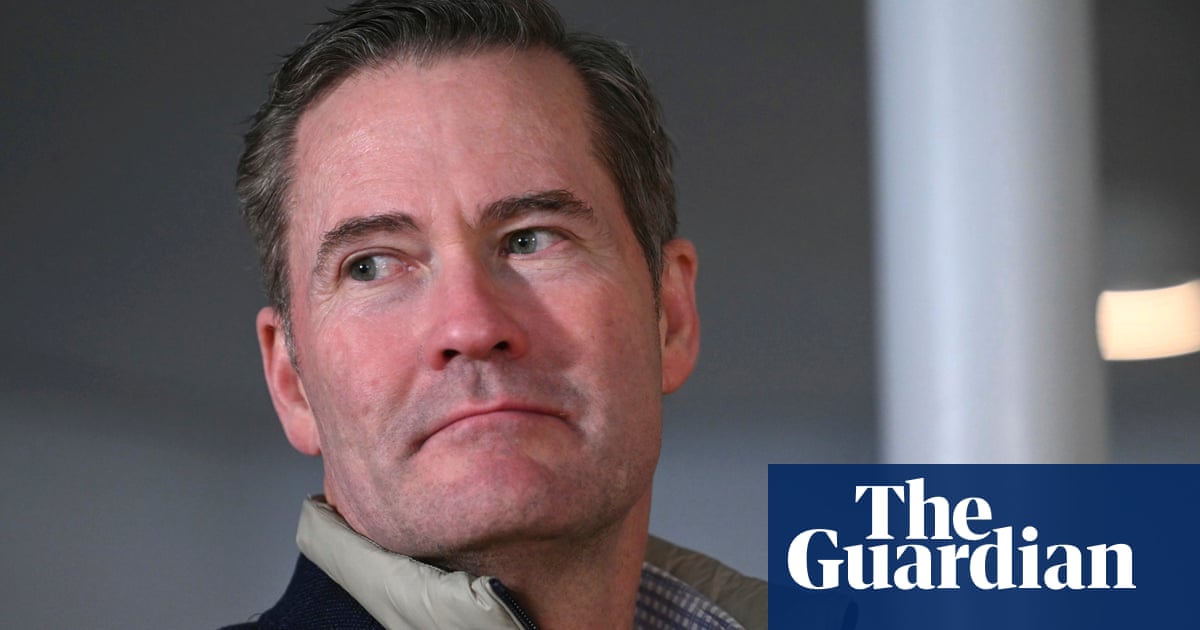At rallies, town halls and protests, voters are unleashing their fury with Donald Trump, stoking what some believe is a populist backlash

Democrats are furious. And they want their leaders to get mad, too.
“I wish you’d be angry,” a constituent told representative Gil Cisneros, a Democrat of California, at a recent town hall. At an event in Minnesota featuring a panel of Democratic attorneys general, an activist voiced a similar sentiment: “Get angry, man,” punctuating the message with a profanity.
The anger roiling the party, slow to build, is now a forceful current coursing through the electorate and pulling in Americans terrified that the country is descending into authoritarianism. Democrats – with no leader to guide them and little power to wield in Washington – are scrambling to harness the sudden fury.
At rallies, town halls and protests, voters are venting their fury with Donald Trump and his empowerment of Elon Musk’s full-frontal assault on federal agencies, stoking what progressive activists believe are the embers of a populist backlash against the president – and the Democratic leaders they believe are not meeting the moment.
Tens of thousands of left-leaning voters flocked to “Fight Oligarchy” rallies hosted by Bernie Sanders and Alexandria Ocasio-Cortez across three western states last week. Democratic members of Congress spoke to packed crowds at events in House districts held by Republicans, who have been advised not to hold town hall meetings in this climate. And the Arizona senator Mark Kelly joined the Tesla Takedown movement, offloading his electric car after a public spat with Musk.

Despite the rising tide of anger, Democrats still have no clear strategy to confront Trump or the chainsaw-wielding Musk, who said in an interview on Thursday that his mission to slash federal spending by $1tn could be completed within weeks. Their popularity is cratering and they remain divided over policy and messaging.
The deep discontent among Democrats has some wondering whether they are on the verge of their own Tea Party-style, grassroots revolt.
“What if we didn’t suck?” Kat Abughazaleh, a 26-year-old progressive TikTok star said in a campaign video launching her bid this week for a safely Democratic Illinois House district that is currently represented by the long-serving representative Jan Schakowsky.
“This isn’t a referendum on Schakowsky,” Abughazaleh said in an interview. “We need to try something different and I am sick of waiting around for someone to do something. There is no mythical, perfect candidate that’s coming out of the woodwork to save us.”
There is near universal agreement that the party needs a post-election reset. In an interview with the Los Angeles Times on Friday, California governor Gavin Newsom, the Democratic leader of the largest blue state, said his party’s brand had become “toxic”.
“People don’t think we make any damn sense,” he said.
Recent polling reflects the grim state of affairs. Just 40% of Democrats approved of the way their leaders in Congress were handling the job, compared with 49% who disapproved, according to a Quinnipiac University poll last month. The survey, which marked what the university’s polling analyst Tim Malloy called a “sobering slap-down of historic proportions for the Democrats in Congress”, was conducted weeks before the Senate minority leader Chuck Schumer provided the votes to pass the Republican-drafted government funding bill that ignited a furious backlash and led to calls for new leadership.
A survey released this week by the progressive polling firm Data for Progress showed that 70% of Democratic voters gave the party’s response to Trump a “C” grade or below, with 21% assigning a failing grade.
A strong majority of respondents expressed a desire for new leadership in the party, with 69% agreeing that older leaders should retire and pass the torch to the next generation: Democrats with the skill and instinct to compete in a more hostile political – and media – landscape. “What if we came out strong, metaphorical guns a-blazing?” Abughazaleh said.
Anger can be a powerful electoral force, said Steven W Webster, political scientist at Indiana University and the author of American Rage: How Anger Shapes Our Politics.
“An angry voter is a loyal voter,” he said, but there is a risk for Democrats if they fail to match the anger in their base, he said: “They run the risk of having their voters turn on them.”
The progressive group Indivisible is leading a campaign demanding Schumer step aside as leader – though Schumer remains defiant. Leftwing groups are also ramping up efforts to challenge Democratic incumbents in next year’s midterm elections.
“The thing that I’m finding, frankly, pretty disconcerting right now is Democrats sticking their heads in the sand and not responding directly to the moment that we’re in,” Ezra Levin, co-founder of Indivisible, said on an organizing call this week.
Theda Skocpol, a Harvard sociologist and political scientist who studied the Tea Party, said the conservative movement was the wrong blueprint for Democrats.
“What the Tea Party did to the GOP, it cannot be done to the Democrats, and if it were, it would relegate them to four decades of minority status,” she said. Skocpol, who also studied the anti-Trump resistance that emerged in response to his 2016 election, said her research showed that engagement at the state and local level helped save the Affordable Care Act and turn the tide for Democrats in the 2018 congressional midterm elections. That was a better model, she argued, and it could begin with the upcoming special elections in Wisconsin and Florida on Tuesday.
An upset victory by the Democrat James Malone for a Pennsylvania state senate seat in a district that had voted overwhelmingly for Trump in November provided a beacon of hope for the party. Vincent Hughes, a Democratic state senator, said Malone’s victory was a “referendum on the chaos Washington Republicans have brought to our state”, adding: “Voters are fed up.”
Part of the challenge Democrats face is leading a resistive movement without a clear leader.
Asked in an open-ended CNN poll to name the Democratic leader they feel “best reflects the core values” of the party, 10% of the respondents said Ocasio-Cortez, followed by Kamala Harris at 9% and Sanders at 8%, while 30% did not provide a name.
“No one,” one respondent told the pollster, according to CNN. “That’s the problem.”
Far lower on the list – or missing entirely – were the Democrats most often cited as potential presidential contenders in 2028: Gavin Newsom, JB Pritzker, Gretchen Whitmer, Josh Shapiro, Chris Murphy and Pete Buttigieg.
Sarah Longwell, publisher of The Bulwark and a prominent anti-Trump Republican pollster who addressed House Democrats at their closed-door retreat in Virginia earlier this month, said she left disillusioned by the state of the opposition’s leadership.
“Nobody knows what time it is. Nobody seems to be ready to meet this moment,” she told an audience in Phoenix during a live taping of her podcast The Next Level.
Among the few exceptions, the conservative host conceded, were Sanders and Ocasio-Cortez because they were actively mobilizing overflow crowds against the Trump administration’s mass firings of federal workers, his attempts to dismantle the Department of Education and the threats to overhaul social security and cut Medicaid and Medicare.
If Americans continued to show up and speak out, Longwell predicted, Trump’s popularity would eventually fall so low that Republicans would start “figuring out a way to offload him” and Democrats would “stop acting like people who are scared of their shadows”.

As their agitated base searchers for fighters, the party is still searching for answers. There is widespread agreement on the diagnosis: that the party must rebuild trust with the working class and win back the cohorts of young people, Latinos and Asian voters who defected to Trump in 2024.
A post-election analysis by the pollster David Shor found that naturalized citizens swung sharply from Joe Biden in 2020 to Trump in 2024, meaning they chose a candidate who promised to close the very same doors they walked through to enter the country. Perhaps most worryingly for the party was their sharp turn toward Trump among young people, especially men.
A growing faction of Democrats favors a populist economic message to recapture these voters.
On Capitol Hill this week, an ideologically mixed group of House Democrats called on their party to embrace a “fighting spirit of patriotic economic populism”.
“Democrats need to wake up and stop defending elites and the establishment,” the representative Chris Deluzio, who represents a competitive Pennsylvania district, said in a floor speech.
“This embrace of economic patriotism might sound and look different depending on where in this country and who the messenger is,” he continued. “But we agree that the era of a spineless Democratic party must end.”
The speech matched the party’s fighting mood since Trump’s re-election. But the party’s identity crisis runs deeper, spanning ideology, policy and messaging.
According to new data from the Republican pollster Patrick Ruffini, nearly 80% of Democrats want the party to take a more combative approach to the president, including 50% who say they want the party to be “much more” combative. It also found Democrats were twice as likely to say they wanted the party to move toward the political center – 42% – rather than to the political left – 20%.
The path forward, according to Ruffini, is what he calls “combative centrism” – candidates who take on Trump and his administration but hold moderate positions on key social and economic issues.
Matt Bennett, a founder of the center-left thinktank Third Way, agrees strongly that the party needs a rebrand, particularly in its approach to working-class voters. But he isn’t convinced that a billionaire-centered critique, championed by leftwing populists like Sanders, is the right approach.
“It isn’t clear that a country that just elected a billionaire whose best friend is the richest guy on Earth is demanding that we fight the oligarchy,” he said. “They’re very mad at both Trump and Elon, not because they’re wealthy, but because they’re vandals that are destroying the American republic.”
“That does not mean in any way that we are taking a backseat in the fight against Trump,” he added.
One lesson many Democrats drew from their 2024 defeat was that opposing Trump was not enough. But showing a willingness to fight him now might be enough to start a conversation with the voters who tuned them out in November.
“I think there’s a lot of opportunity to step in with some fresh leadership and some fresh ideas, and to be bold and on offense,” said Rebecca Cooke, a Democrat who is running for the chance to unseat the Republican representative Derrick Van Orden in a politically competitive Wisconsin House district. “I think we play defense a little bit too much, and I think that it’s important for us to be a little bit more uninhibited as Democrats.”
Rachel Leingang contributed to this report

 German (DE)
German (DE)  English (US)
English (US)  Spanish (ES)
Spanish (ES)  French (FR)
French (FR)  Hindi (IN)
Hindi (IN)  Italian (IT)
Italian (IT)  Russian (RU)
Russian (RU)  2 days ago
2 days ago
























Comments